
As a fanfiction writer, you've probably felt the frustration of using ChatGPT. One day, your favorite prompt writes perfect character dialogue, the next when you continue the chat, it's a censored mess with a new update. You worry about your creative work becoming training data, and the rising subscription costs are a constant annoyance. And what are the best AI Fanfiction Generator?
This guide explores other AI Fanfiction alternatives, but also adding a new way to help your writing: a local LLMs tool—fast, private, and offline alternative. We'll show you how to set up your own system, choose the right models, and use specific prompts and settings to create high-quality fanfiction on your own terms.
CONTENT:
- Why Go Local: Your Private AI Fanfiction Generator
- The Writer's Toolkit: What to Look for in a Local AI
- Best Local LLMs for Fanfiction Writing
- Top 5 AI Fanfiction Writing Software
- A Practical Fanfiction AI Workflow with Writing Prompts
- Before Start: Creating Custom AI Writing Personas Prompts
- Your First Story in 15 Minutes: A Simple Guide
- Next-Level Workflow: Bringing Your Fanfic to Life
- Quick Comparison
- Frequent Asked Questions(FAQ)
- Conclusion
Why Go Local: Your Private AI Fanfiction Generator
Writers using online AI often face a major hurdle: censorship. This is why many search for an uncensored ai writing generator or ask, “does character ai allow nsfw?”. For which the answer is typically no. For those looking to write about dark themes, complex characters, or erotic fiction ai, the solution is to go local. Running an AI on your own computer means total privacy and zero censorship—your data never leaves your machine, and the AI serves your vision without judgment.
Opting for a local AI also provides practical advantages in ownership and cost. You own your entire creative process, free from changing terms of service. While setup requires initial hardware investment, it eliminates recurring monthly fees, making it a more affordable long-term solution for serious creators.
Try Nut Studio for Private, Unrestricted Writing.
The Writer's Toolkit: What to Look for in a Local AI
Writing fiction is an art of imagination, not a feat of engineering. Yet, many emerging AI tools can make you feel more like a programmer than a novelist. This guide will help you cut through the technical jargon and identify the features that truly matter for creative writing, transforming your AI from a confusing command line into a powerful creative partner.
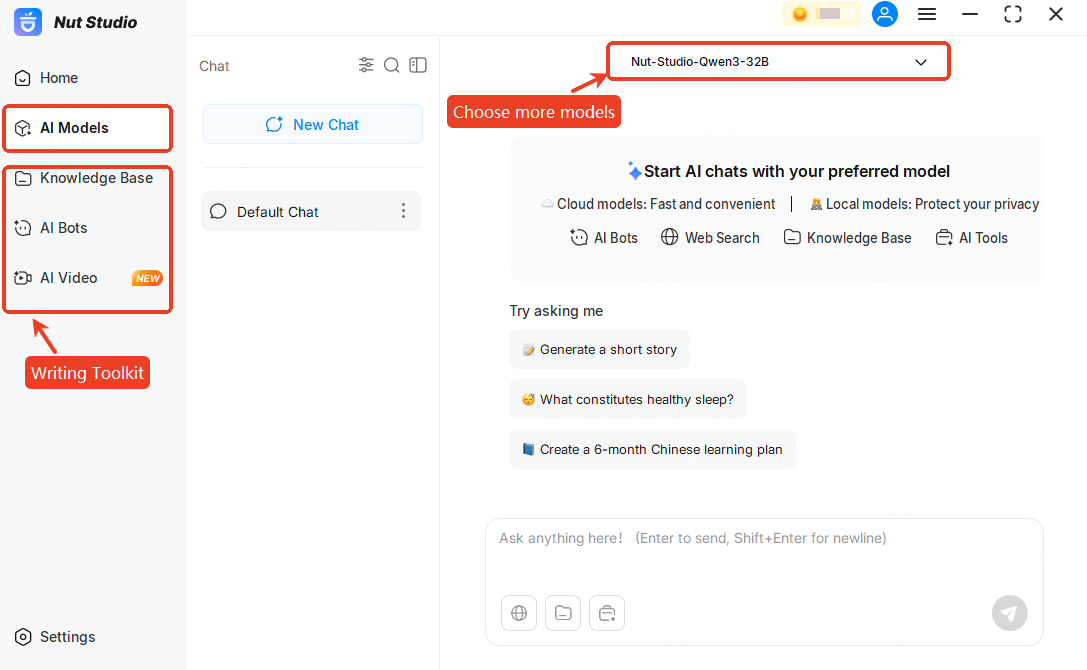
To avoid getting bogged down in technical configurations, look for a local AI application that prioritizes a writer's workflow. Here are the essential features that make a real difference.
1) Intuitive Model Management
Filter by series (e.g., Mistral for creative tasks; Llama generalist; Qwen multilingual), size (7B, 13B, 30B+), and purpose (LLMs, Vision, Reasoning). Recommendation: start with Mistral-based models for balanced creativity and efficiency.
By Series: Different model families have different strengths. For example, the Mistral series is widely regarded for its strength in creative and narrative tasks, while others like Llama are excellent generalists, and models like Qwen excel in multilingual contexts.
By Size: The model's size (measured in billions of parameters, like 7B, 13B, or 30B+) directly impacts its performance and hardware requirements. A good tool helps you match a model to your computer's capabilities, from lightweight options for basic laptops to powerful models for high-end systems.
By Purpose: The best tools differentiate between models for writing (LLMs), image generation or analysis (Vision), and complex problem-solving (Reasoning).
2) Integrated Knowledge Base Upload chapters, character sheets, bibles, and outlines so the AI understands your universe without repeating context each time.
3) A Writer-First Interface. Clean design, minimal friction—no terminals, scripts, or confusing settings just to write a paragraph. The goal is to write, not to debug code. Seek out tools with a clean, intuitive design. Your focus should be on your manuscript and your ideas, with the AI acting as an assistant within that space.
Now that you know what features to look for in your writing software, let's explore the engine that powers it all: the Large Language Models themselves.
Best Local LLMs for Fanfiction Writing
Once you have your local AI application set up, the next crucial step is choosing your writing partner: the Large Language Model (LLM). Different models have distinct "personalities" and strengths. The "best" one often comes down to personal preference and the specific needs of your story.
Below is a comparison of three popular and highly capable model families that run well on consumer hardware. We recommend starting with their smaller variants (around 7B or 8B parameters) as they offer a fantastic balance of speed and quality.
- DeepSeek (e.g., DeepSeek-Coder-V2-Lite-Instruct): Best for writers who enjoy crafting very specific, detailed prompts and want an AI that can follow nuanced instructions with high fidelity.
- Mistral (e.g., Mistral 7B Instruct): Writers who want a balance of creativity, speed, and instruction-following. Often considered the gold standard for creative writing in the local AI community.
- Llama 3 (e.g., Llama 3 8B Instruct): Writers who are building complex worlds, managing intricate plots, or need the AI to handle logical reasoning and consistency.
- DeepSeek: Instruction fidelity, unique voice, strong in dialogue
- Mistral: Flowing prose, great instruction following, community favorite
- Llama 3: Strong reasoning, high-quality output, excellent generalist
- DeepSeek: Vague prompts lead to poor results, requires detailed guidance
- Mistral: Less rigid with logic, needs guidance for complex plot-heavy narratives
- Llama 3: Can be slightly formal or "safer" in creative choices, benefits from detailed persona prompts
Transform your novel writing process with Nut Studio's locally‑run AI
Top 5 AI Fanfiction Writing Software
With an understanding of the underlying models, let's learn and examine the recommended top applications, see what's different with those LLMs and tools.
1 Sudowrite
If you're a fiction author looking to brainstorm, expand scenes, and polish prose, Sudowrite might be your ideal companion. It's specifically designed for creative writers with curated templates like Describe, Rewrite, and Brainstorm. This cloud-based tool features a refined, writer-first interface that has garnered significant attention and positive reviews on Reddit.
While it excels at polishing prose with its intuitive UX, the $19 monthly subscription represents a notable investment. The framework and style remain consistent, with content details added seamlessly. However, some users report that AI suggestions can become repetitive or may require substantial prompt engineering.
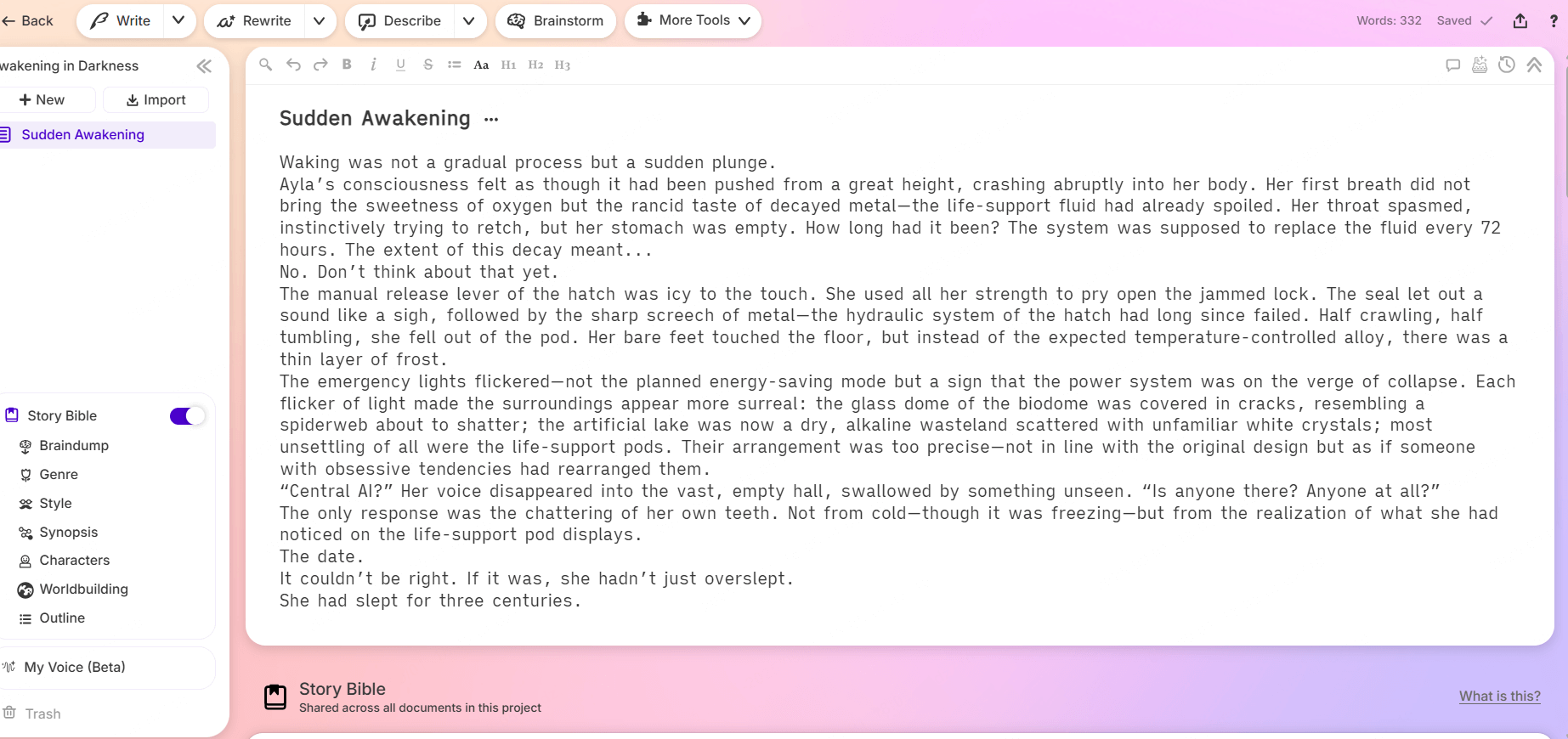
Key Features of Sudowrite:
- Prose Polishing Excellence: Specialized tools for refining and enhancing your writing style with minimal friction.
- Writer-First Interface: Intuitive, minimal friction UX designed specifically for creative writers.
- Guided Prompts: Strong style control with templates that guide your creative process.
- Cloud-Based Platform: Access your work from anywhere, though with limited control over data locality.
- Excellent prose-polishing and brainstorming tools
- Intuitive, minimal friction UX for writers
- Strong style control and guided prompts
- Expensive for heavy users
- Cloud-based; limited control over data locality
- NSFW constraints
2 NovelAI
NovelAI distinguishes itself in the creative writing space by offering unrestricted content generation without filters, making it particularly appealing to writers exploring mature themes and character relationships often restricted on other platforms. This freedom makes it especially popular among fanfiction writers who need flexibility in their storytelling.
However, this freedom requires self-moderation, and its subscription-based pricing model entails ongoing costs for access. The platform combines text generation with anime-style image creation, providing a comprehensive toolkit for creative projects.
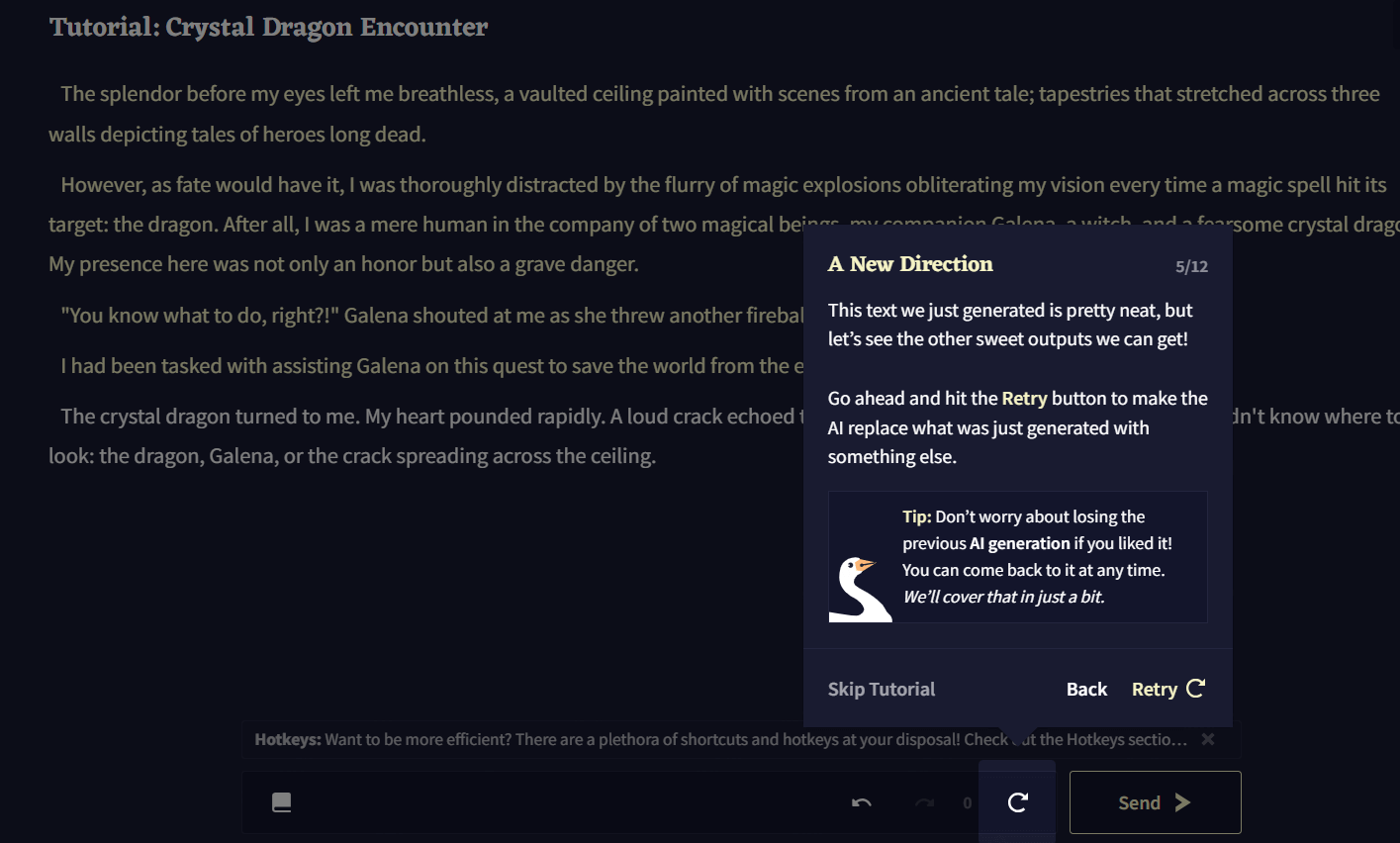
Key Features of NovelAI:
- NSFW Content Allowed: Perfect for exploring different themes in fanfiction without restrictions.
- Lorebook Integration: Maintain consistency with source material characters, settings, and established canon.
- Anime-Style Image Generation: A convenient tool to support your fanfiction covers and visual elements.
- Flexible Content Control: Full creative freedom with self-moderation responsibility.
- NSFW and mature content allowed
- Lorebook integration for consistency
- Anime-style image generation included
- Cloud-based subscription model with ongoing costs
- Requires tuning/testing to get preferred style
- Limited project management vs dedicated author suites
3 Novelcrafter
Novelcrafter offers exceptional value at $14 per month for its Artisan tier, serving both fiction and nonfiction writers effectively. The platform's Codex feature can be adapted to store research materials for nonfiction projects, while maintaining strong organizational tools for fiction.
Its versatility makes it suitable for long-form creative nonfiction like memoirs, though it may require some adaptation for different nonfiction formats. The relatively affordable pricing makes it accessible for most writers, and its ability to work with multiple backends provides flexibility in AI model selection.
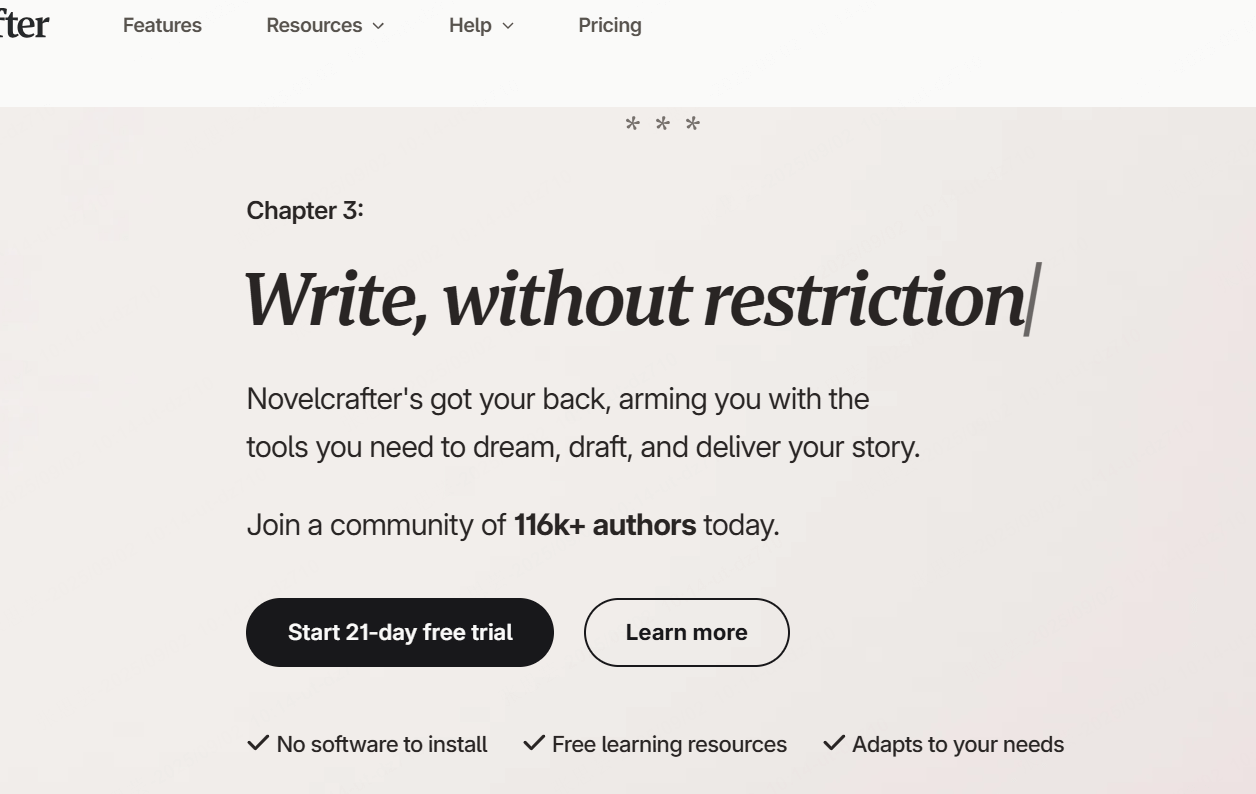
Key Features of Novelcrafter:
- Versatile Codex System: Adaptable for storing both fictional worldbuilding and nonfiction research materials.
- Strong Outlining Tools: Excellent structural tools for planning and organizing long-form content.
- Multiple Backend Support: Works with various AI models, giving you flexibility in choosing your preferred engine.
- Series Planning: Ideal for maintaining continuity across multiple books or long projects.
- Strong outlining and structural tools
- Good for series planning and continuity
- Works with multiple backends
- Experience and NSFW depend on underlying model
- Learning curve for full feature set
- May require external APIs or setups
4 Character.ai
Character.ai primarily serves casual users and those interested in character-driven conversations rather than structured novel writing. Its strength lies in creating character sets and engaging in immersive roleplay scenarios. The platform offers free access with a massive library of pre-made characters.
While extremely easy to use and fun for character voice exploration, it explicitly prohibits NSFW content, which limits creative freedom for some writers. Recent user reports suggest a decline in AI quality, potentially affecting the writing experience for serious novelists.
Key Features of Character.ai:
- Massive Character Library: Access thousands of pre-made characters for instant interaction and inspiration.
- Easy Character Creation: Simple tools for developing unique character voices and personalities.
- Conversational Ideation: Perfect for exploring dialogue and character interactions through chat.
- Free Access: Basic features available without subscription, making it accessible to all writers.
- Extremely easy to use
- Fun for character voices and conversational ideation
- Massive character library
- No NSFW content
- Recent reports of declining AI quality
- Cloud-only; limited document management
5 Claude
Claude provides exceptional capability with its 200K+ token context window, allowing it to handle roughly 500 pages of text simultaneously. This makes it particularly powerful for maintaining narrative consistency across long works. The platform emphasizes data privacy and offers professional-grade AI assistance.
With high-quality reasoning and editing capabilities, Claude excels at complex writing tasks and understanding nuanced context. However, the paid service model creates ongoing costs, and the general-purpose nature means it lacks writing-specific optimization.
Key Features of Claude:
- Massive Context Window: Handle 200K+ tokens (roughly 500 pages) for exceptional narrative continuity.
- Professional-Grade Reasoning: High-quality analysis and editing for complex writing tasks.
- Strong Privacy Focus: Emphasizes data protection and secure handling of your content.
- Reliable Performance: Consistent, high-quality outputs for demanding writing projects.
- Exceptional long-context understanding
- High-quality reasoning and editing
- Strong reliability for complex tasks
- Paid service; costs can add up
- Safety filters restrict NSFW
- Cloud-based; data privacy depends on plan
Run powerful AI models locally with extended context windows--maintain complete privacy without subscription fees.
A Practical Fanfiction AI Workflow with Writing Prompts
Once you have a tool with the right features, you can unlock its full potential by moving beyond simple commands. This workflow will help you generate high-quality, consistent prose for your novel or fanfiction. Here we share a workflow you could start with Nut Studio.
Before Start: Creating Custom AI Writing Personas Prompts
To achieve truly high-quality and consistent results, you must go beyond basic prompts. To achieve exceptional outcomes, it’s important to teach the AI not only what to write but also how to write. You can start with a plot command or begin by defining the character along with their background, goals, voice, and style.This approach allows for role-based prompting that can adapt to various writing styles. Before starting a writing session, provide your AI with a detailed persona using a template like this:
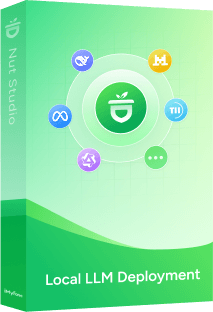
- Perspective: whose eyes, how much they know, bias/filters
- Emotional Texture: what feelings dominate, how they're conveyed
- Voice Personality: how the narrator sounds, their relationship to the story
- Language Choices: formal/casual, technical/simple, imagery types
- Sentence Flow: rhythm patterns, variety, emphasis techniques
- Story Movement: how fast/slow, what gets focus, transitions
- Character Speech: how people talk, what's said vs. implied
- World-Building: how setting comes alive, sensory priorities
- Story Architecture: how chapters/sections work, reveals
- Signature Patterns: what makes this voice unique, recurring elements
Your First Story in 15 Minutes: A Simple Guide
These persona elements form the foundation of effective character development. For writers interested in interactive character exploration, check out our collection of roleplay prompts to bring your characters to life through dialogue.
Step 1: Choose and Load Your AI Partner
Select an appropriate LLM from Nut Studio model library. For optimal balance between speed and creative quality, consider a Mistral-based model in the 7-20B range.
For example, using Dumbledore as a reference, I defined his AI agent's character background and writing requirements. Then, I provided the AI with an opening prompt: "Please describe a typical day for Dumbledore." I used Mistral 7B for this task and found its creative output to be more effective than Gemma.
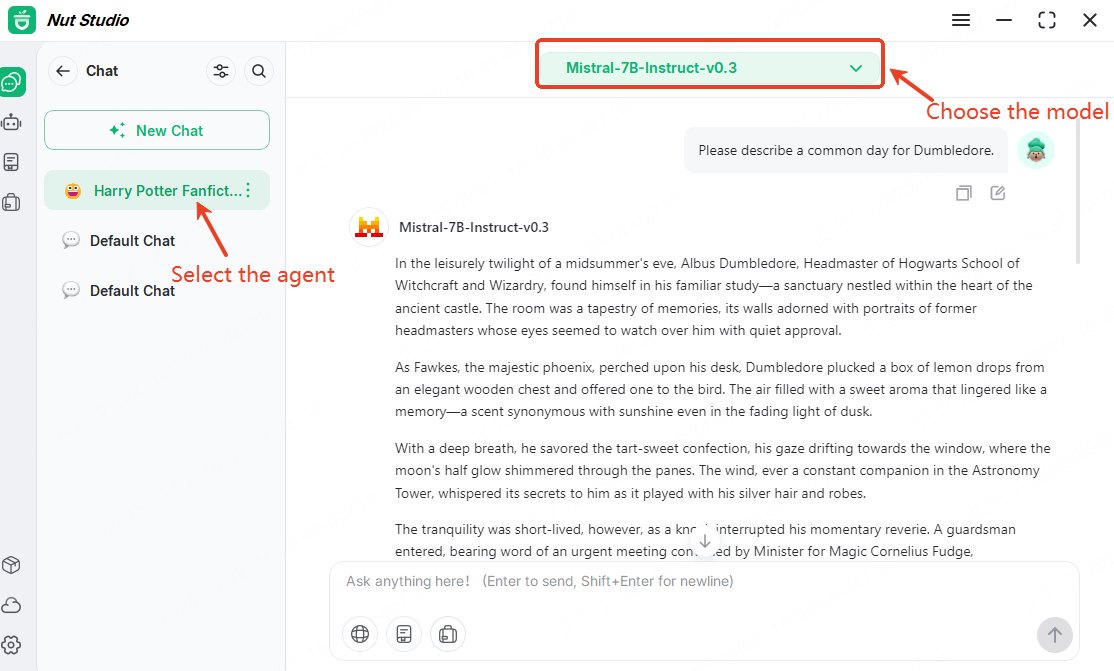
Step 2: Build Your Context Foundation
Use the Knowledge Base feature to upload essential documents: your Writer's Persona prompt, existing chapters or scenes, character profiles, and plot outlines.
Step 3: Co‑Author with Precision. Be specific and context-aware.
Prompt Examples:
❌ Poor Prompt: "Write the next chapter."
✅ Effective Prompt: "Using the attached 'Gothic Horror' writer persona, continue from Chapter 3's ending. Sarah has just discovered the hidden door. Maintain the suspenseful tone while focusing on her cautious personality as she explores what lies beyond."
Additional Context-Rich Prompts:
For Scene Continuation: "Based on the uploaded Chapter 5, write the next 500 words. Sarah just entered the abandoned mansion. Preserve the established gothic atmosphere and her cautious personality from her character sheet."
For Dialogue Generation: "Create a tense conversation between Mark and Elena about the stolen artifact. Reference their shared history of broken trust from Chapter 2. Mark should be defensive while Elena remains accusatory."
For Plot Development: "Using the plot outline in my knowledge base, suggest three unexpected midpoint twists. Each must align with the established magic system and character motivations."
By combining the right tool with a detailed persona and specific, context-rich prompts, your AI writing assistant transforms from a simple text generator into a sophisticated collaborator—one that helps you refine your story, overcome writer's block, and discover new creative possibilities.
Next-Level Workflow: Bringing Your Fanfic to Life
Many writers try local AI tools like LM Studio or KoboldCpp and quit because they are too technical. They spend hours tweaking "temperature settings" instead of writing.
On the other hand, cloud-based services like ChatGPT and Claude impose heavy censorship on creative fanstories, especially fanfiction exploring romantic themes from popular series like Love and Deepspace. This leaves creators stuck between overly technical local solutions and restrictive online platforms that hinder creative freedom.
Nut Studio bridges this gap by combining the privacy and control of local AI with the simplicity of cloud services. Our one-click model installation analyzes your hardware and recommends compatible models. Unlike complex alternatives, you can start writing within minutes of downloading the software. The platform runs entirely offline, ensuring your fanfiction and original stories remain private while providing unlimited creative freedom.
Here are three practical scenarios of how a modern AI workflow can transform your fanfiction writing process using Nut Studio.
Scenario 1: The "Living" Character Sheet (Solving Flat OCs)
The Pain Point: You have a great idea for an Original Character (OC), but they feel flat next to the canon characters. You struggle to keep their voice consistent across 50 chapters.
The Workflow:
Instead of keeping a static notepad file, use Contextual Intelligence.
- Input Tags: In Nut Studio, type basic tags like "Ancient Fantasy Setting + Frail Young Master Trope + Hidden Dark Magic."
- Generate & Refine: The local LLM generates a deep psychological profile, behavioral quirks, and backstory options.
- Lock it in: Save this as a "Character Asset." Now, whenever you write a scene, the AI references this asset. If your "frail" character suddenly runs a marathon, the AI will flag it or suggest a rewrite where they struggle, maintaining perfect consistency.
Scenario 2: The "Flow State" Assistant (Solving Writer's Block)
The Pain Point: You are in the zone, but you get stuck on a transition. Switching tabs to ChatGPT breaks your immersion, and by the time you copy-paste the text back, the vibe is lost.
The Workflow:
Stay in the editor with In-Line Assistance.
- Contextual Trigger: You are stuck on a dialogue scene. You type: "Continue this argument, but make Character A reveal their secret."
- Seamless Expansion: The AI reads the previous 5,000 words of your chapter (locally) to understand the tension. It generates the dialogue directly in your document.
- One-Click Polish: Highlight a clunky paragraph and click "Rewrite for Angst" or "Expand Sensory Details." No copy-pasting, no tab switching.
Scenario 3: From Text to Tik Tok (Solving the Visual Barrier)
The Pain Point: You want to promote your fic on Tik Tok or Instagram Reels, but you aren't an artist or video editor. Readers love visuals, but commissioning art is expensive.
The Workflow:
Use One-Click Text-to-Video.
- Select Your Scene: Highlight that emotional climax or the description of your character's new outfit.
- Choose Your Style: Select a visual model—use PixVerse, Kling for an Anime/Manhwa aesthetic or Veo 3.1 for a cinematic, realistic look.Learn more about optimizing prompts for character dialogue and voice in our guide on how to prompt for speaking in VEO 3.
- Generate: Within moments, the tool converts your text into a short video loop or character PV (Promotional Video). You can even upload a reference image to ensure the AI gets the hair color right. Now you have viral-ready content to link back to your AO3 or Wattpad story.
Quick Comparison
| Feature | Sudowrite | NovelAI | Novelcrafter | Character.ai | Claude | Nut Studio |
|---|---|---|---|---|---|---|
| Price | $19/month | Free 50 actions $10/month | $14/month | Free/Premium | Paid | Free |
| NSFW | Limited | √ | Limited | × | Limited | Configurable |
| Local Running | × | × | × | × | × | √ |
| Data Privacy | Cloud-based | Cloud-based | Cloud-based | Cloud-based | Cloud-based | Complete local control |
| Model Variety | Fixed | Fixed | Fixed | Fixed | Claude models | 50+ downloadable models |
| Setup Hardness | Easy | Easy | Easy | Easy | Easy | Simple one‑click |
| Offline Capability | No | No | No | No | No | Yes |
| Custom Agents | No | No | Limited | Limited | No | Yes |
| Token Limit | Limited | Limited | Limited | Limited | 200K+ | No limits |
| User Type | Fiction writers | Creative writers | All writers | Casual users | Professionals | All levels |
Frequently Asked Questions (FAQ)
1 Is my fanfiction private when I use an AI fanfiction writer?
Using offline LLM tools like Nut Studio significantly enhances privacy. All your creative content remains stored locally on your computer. Local installations keep everything on your device, offering maximum privacy for your stories.
2 Do I need to train my own model for better writing results?
Not necessarily. Fine-tuning existing models can effectively improve your writing results. Fine-tuning involves adapting pre-trained models to your specific writing style, character voices, plot requirements, and genre preferences. The key is experimenting with different prompts and data sets to match your project's specific requirements.
3 What’s the best AI model for writing fanfiction?
For local deployment, Mistral(11B to 20B) and DeepSeek R1 are excellent lightweight models that can run offline. For cloud options, Claude excels at prose and complex narratives, while NovelAI is highly customizable. Nut Studio allows you to easily download and switch between over 50 models to find the perfect fanfiction AI writer for your style.
Conclusion
The power to create compelling fanfiction is now more accessible than ever, but choosing the right tool is crucial. While cloud platforms offer convenience, they come at the cost of creative control, privacy, uncensored content limited and ongoing fees. By embracing a local AI workflow, you can build a truly private and uncensored writing sanctuary on your own computer.
As we've shown, the key to success lies in choosing a user-friendly application, managing your AI models effectively, and using a context-aware workflow with detailed prompts. By doing so, you transform your AI from a simple text generator into a true creative partner that understands your world and helps you tell your stories, your way.
 Nut Studio
Nut Studio















Was this page helpful?
Thanks for your rating
Rated successfully!
You have already rated this article, please do not repeat scoring!